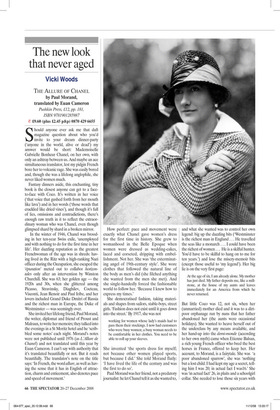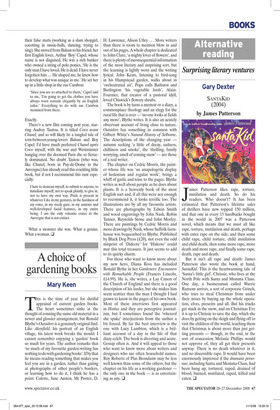The new look that never aged
Vicki Woods
THE ALLURE OF CHANEL by Paul Morand, translated by Euan Cameron Pushkin Press, £12, pp. 181, ISBN 9781901285987 ✆ £9.60 (plus £2.45 p&p) 0870 429 6655 Should anyone ever ask me that daft magazine question about who you’d invite to your dream dinner-party (‘anyone in the world, alive or dead’) my answer would be short: Mademoiselle Gabrielle Bonheur Chanel, on her own, with only an ashtray between us. And maybe an ace simultaneous translator, lest my pidgin French bore her to volcanic rage. She was easily bored and, though she was a lifelong anglophile, she never liked women much.
Fantasy dinners aside, this enchanting, tiny book is the closest anyone can get to a faceto-face with Coco. It’s written in her voice (‘that voice that gushed forth from her mouth like lava’) and in her words (‘those words that crackled like dried vines’), and though it’s full of lies, omissions and contradictions, there’s enough raw truth in it to reflect the extraordinary woman who was Chanel, even though glimpsed shard by shard in a broken mirror.
In the winter of 1946, Chanel was brooding in her ten-year Swiss exile, ‘unemployed and with nothing to do for the first time in her life’. Her dazzling reputation as the greatest Frenchwoman of the age was in shreds: having lived in the Ritz with a high-ranking Nazi officer during the Occupation, she escaped the ‘épuration’ meted out to collabos horizontales only after an intervention by Winston Churchill. She was 63; her golden age — the 1920s and 30s, when she glittered among Picasso, Stravinsky, Diaghilev, Cocteau, Visconti, Jean Renoir and Paul Iribe, and her lovers included Grand Duke Dmitri of Russia and the richest man in Europe, the Duke of Westminster — was seemingly over.
She invited her lifelong friend, Paul Morand, the writer, diplomat and friend of Proust and Malraux, to write her memoirs; they talked into the evenings in a St Moritz hotel and he ‘scribbled some notes’ each night. Morand’s notes were not published until 1976 (as L’Allure de Chanel) and not translated until this year by Euan Cameron. I can’t say with authority that it’s translated beautifully or not. But it reads beautifully. The translator’s note on the title says: ‘In French, the word allure, as well as having the sense that it has in English of attraction, charm and enticement, also denotes pace and speed of movement.’ How perfect: pace and movement were exactly what Chanel gave women’s dress for the first time in history. She grew to womanhood in the Belle Epoque when women were dressed as wedding-cakes, laced and corseted, dripping with embellishment. Not her. She was ‘the exterminating angel of 19th-century style’. She wore clothes that followed the natural line of the body as men’s did (she filched anything she wanted from the men she met). And she single-handedly forced the fashionable world to follow her. ‘Because I knew how to express my times.’ She democratised fashion, taking materials and shapes from sailors, stable-boys, street girls. ‘Fashion does not exist until it goes down into the street.’ By 1917, she was not
working for women whose lady’s maids had to pass them their stockings. I now had customers who were busy women; a busy woman needs to be comfortable in her clothes. You need to be able to roll up your sleeves.
She invented ‘the sports dress for myself; not because other women played sports, but because I did.’ She told Morand flatly: ‘I have lived the life of the century and was the first to do so’.
Paul Morand was her friend, not a predatory journalist: he let Chanel tell it as she wanted to, and what she wanted was to control her own legend: big up the dazzling bits (‘Westminster is the richest man in England . . . He travelled the seas like a monarch . . . I could have been the richest of women . . . He is a skilful hunter. You’d have to be skilful to hang on to me for ten years.’) and lose the misery-memoir bits (except those useful to ‘my legend’). Her big lie is on the very first page:
At the age of six, I am already alone. My mother has just died. My father deposits me, like a millstone, at the house of my aunts and leaves immediately for an America from which he never returned.
But little Coco was 12, not six, when her (unmarried) mother died and it was to a dirtpoor orphanage run by nuns that her father abandoned her (the aunts were occasional holidays). She wanted to heave herself out of the underclass by any means available, and her hand-up into the demi-monde (according to her own myth) came when Etienne Balsan, a rich young French officer who bred the best horses in France, offered to keep her. Her account, to Morand, is a fairytale. She was ‘a poor abandoned sparrow’, she was ‘nothing but a lost child. I had kept my age a secret, telling him I was 20; in actual fact I was16.’ She was ‘in actual fact’ 26, in plaits and a schoolgirl collar. She needed to lose those six years with their false starts (working as a slum shopgirl, cocotting in music-halls, dancing, trying to sing). She moved from Balsan to his friend, her first English lover, Arthur ‘Boy’ Capel, whose name is not disguised. He was a rich banker who owned a string of polo ponies. ‘He is the only man I have loved. He is dead. I have never forgotten him ... He shaped me, he knew how to develop what was unique in me.’ He set her up in a little shop in the rue Cambon:
‘Since you are so attached to them,’ Capel said to me, ‘I’m going to get the clothes you have always worn remade elegantly by an English tailor.’ Everything to do with rue Cambon stemmed from there.
Exactly.
There’s a new film coming next year, starring Audrey Tautou. It is titled Coco avant Chanel, and so will likely be a tangled tale of torn-between-young-lovers Balsan and Boy Capel. I’d have much preferred Chanel après Coco myself, with the war and Westminster hanging over the doomed Paris she so fiercely dominated. No doubt Tautou (who was, like Chanel, born in Puy-de-Dome in the Auvergne) has already read this crackling little book, but if not I recommend this rant especially:
I hate to demean myself, to submit to anyone, to humiliate myself, not to speak plainly, to give in, not to have my own way. Pride is present in whatever I do, in my gestures, in the hardness of my voice, in my steely gaze, in my anxious and well-developed facial features, in my entire being. I am the only volcanic crater in the Auvergne that is not extinct.
What a monster she was. What a genius. What a woman. ❑























































































































 Previous page
Previous page